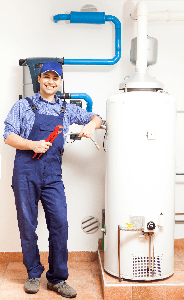Repair or Replace Your Hot Water Heater
09/11/17

Your hot water heater is one of the most important appliances within your home, providing hot water to all of your water fixtures and appliances as needed. This means that if your hot water heater begins to malfunction or no longer works at all, your day to day schedule can be completely disrupted. Fortunately, a failing hot water heater will exhibit a number of red flags long before it actually fails, and understanding what these signs are can allow you to contact a plumber to come in and take a look at your unit to determine if it needs to be repaired or replaced.
Low Hot Water Pressure and Sediment
One of the most common issues associated with older and malfunctioning water heaters is reduced water pressure when turning on your hot water supply. This usually comes with some sort of sediment, which can take the form of a white chalky buildup on your water fixtures, or a rusty or sandy mineral actually dissolved in the water coming out of your tap. Both point to sediment becoming built up within your hot water tank: it can sometimes also point to damage within your plumbing itself. The chalky buildup is caused by hard water, and can reduce the effectiveness of your water heater by blocking the heating elements. The rusty or sandy sediment refers to some sort of contamination in your water supply, and can have the same effect on your water heater. Both types of sediment can also clog up your water heater and your plumbing, reducing your hot water pressure.
If you notice either of these things occurring, you should contact us at Roto-Rooter Sewer and Drain Cleaning to have your water heater flushed and your plumbing examined for any other issues.
Strange Sounds
Beyond sediment actually appearing in your water supply and on your water fixtures, a buildup of sediment within your hot water heater can also manifest itself through strange, loud rumbling sounds coming from the storage tank when you turn the hot water on. This points to a thick, hard layer of sediment sitting on the heating elements, which greatly reduces the efficiency of your water heater and makes a leak or other mechanical malfunction much more likely.
Reduced Water Supply and Cold Water
One of the most obvious signs that there is an issue with your hot water heater is if you have a reduced overall supply of hot water, or no hot water at all. This usually points to some sort of mechanical failure within the heater itself. For gas heaters, this can be as simple as having a professional come in to relight the pilot light, but when it comes to electric heaters or more serious issues, the heating elements themselves may have become damaged or disconnected. This can sometimes be fixed, but it depends on the nature and extent of the failure: if the damage is too extensive, the unit will have to be replaced.
Leaks and Repairs
Finally, leaks in your hot water heater are the most obvious indication that it may be time to get a new unit installed. However, minor leaks can often be patched up or fixed at a much smaller cost, and if they have occurred because of some sort of unrelated physical damage (such as something hitting the hot water tank and causing a dent or crack), repair might be the way to go. Keep in mind that constant repairs will quickly add up in cost, and if you find yourself pulling your hair out over mechanical issues or minor leaks that just keep coming back, your unit is on its last legs and should be replaced as soon as possible. This is especially true because having an old unit repaired constantly will quickly rack up the bills, often in excess of the cost a brand new water heater.
Posted in: Knowledgebase, Plumbing




